UK Policy Measures Against Deglobalization and Disadvantages Analysis
VerifiedAdded on 2023/06/12
|8
|2356
|494
Report
AI Summary
This report examines the impact of deglobalization on the UK economy and the policy measures implemented by UK policymakers to mitigate its effects. It discusses strategies such as minimizing trade tariffs, providing subsidies to UK businesses, and supporting domestically produced goods. The report also recognizes the benefits of international trade, including specialization, access to cheaper imports, increased competition, and foreign direct investment. Furthermore, it identifies and discusses key disadvantages of globalization for UK firms, such as growing inequality, inflation, unemployment, dominance of global brands, and tax avoidance. The report concludes by emphasizing the importance of carefully managing the benefits and limitations of globalization to ensure effective business operations.

Report
Paraphrase This Document
Need a fresh take? Get an instant paraphrase of this document with our AI Paraphraser
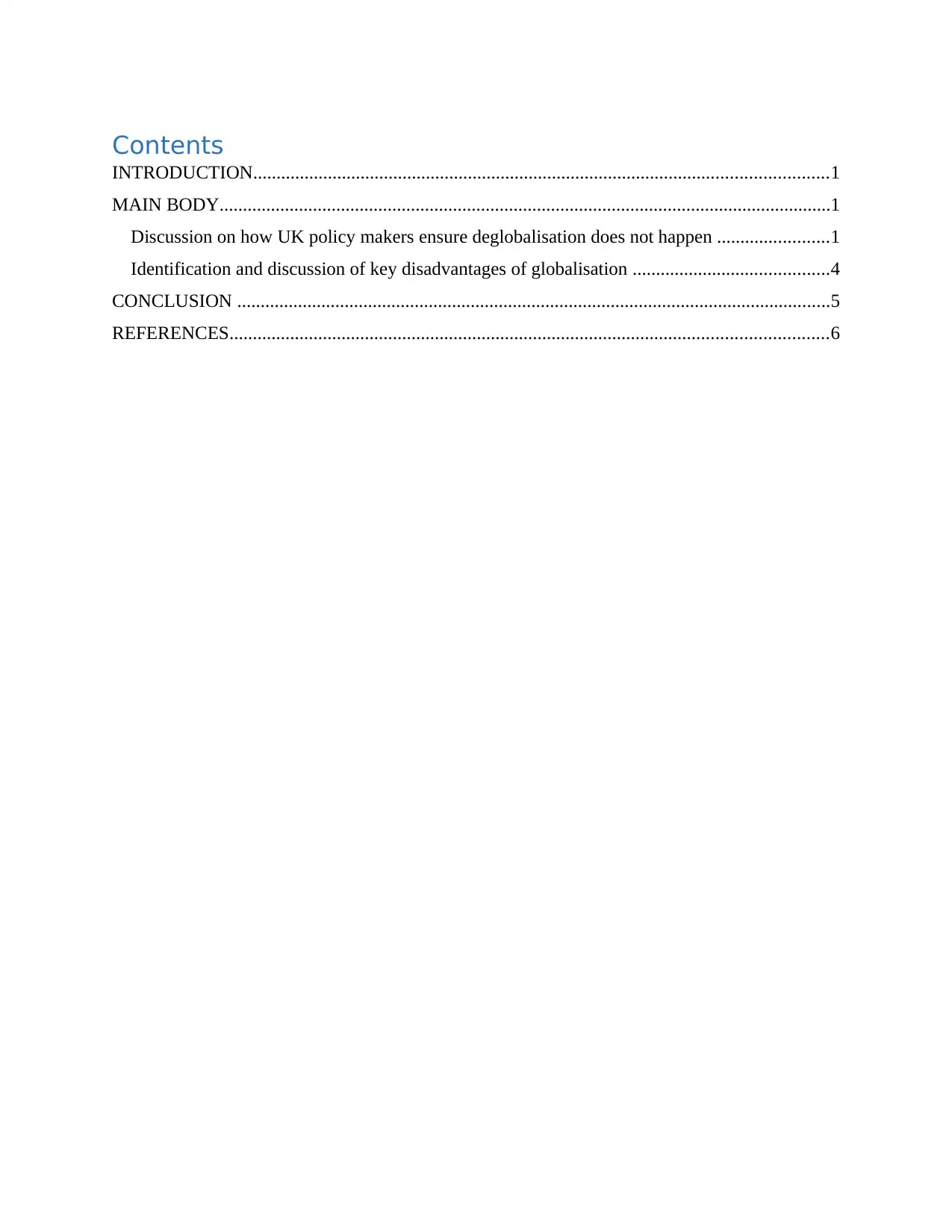
Contents
INTRODUCTION...........................................................................................................................1
MAIN BODY...................................................................................................................................1
Discussion on how UK policy makers ensure deglobalisation does not happen ........................1
Identification and discussion of key disadvantages of globalisation ..........................................4
CONCLUSION ...............................................................................................................................5
REFERENCES................................................................................................................................6
INTRODUCTION...........................................................................................................................1
MAIN BODY...................................................................................................................................1
Discussion on how UK policy makers ensure deglobalisation does not happen ........................1
Identification and discussion of key disadvantages of globalisation ..........................................4
CONCLUSION ...............................................................................................................................5
REFERENCES................................................................................................................................6
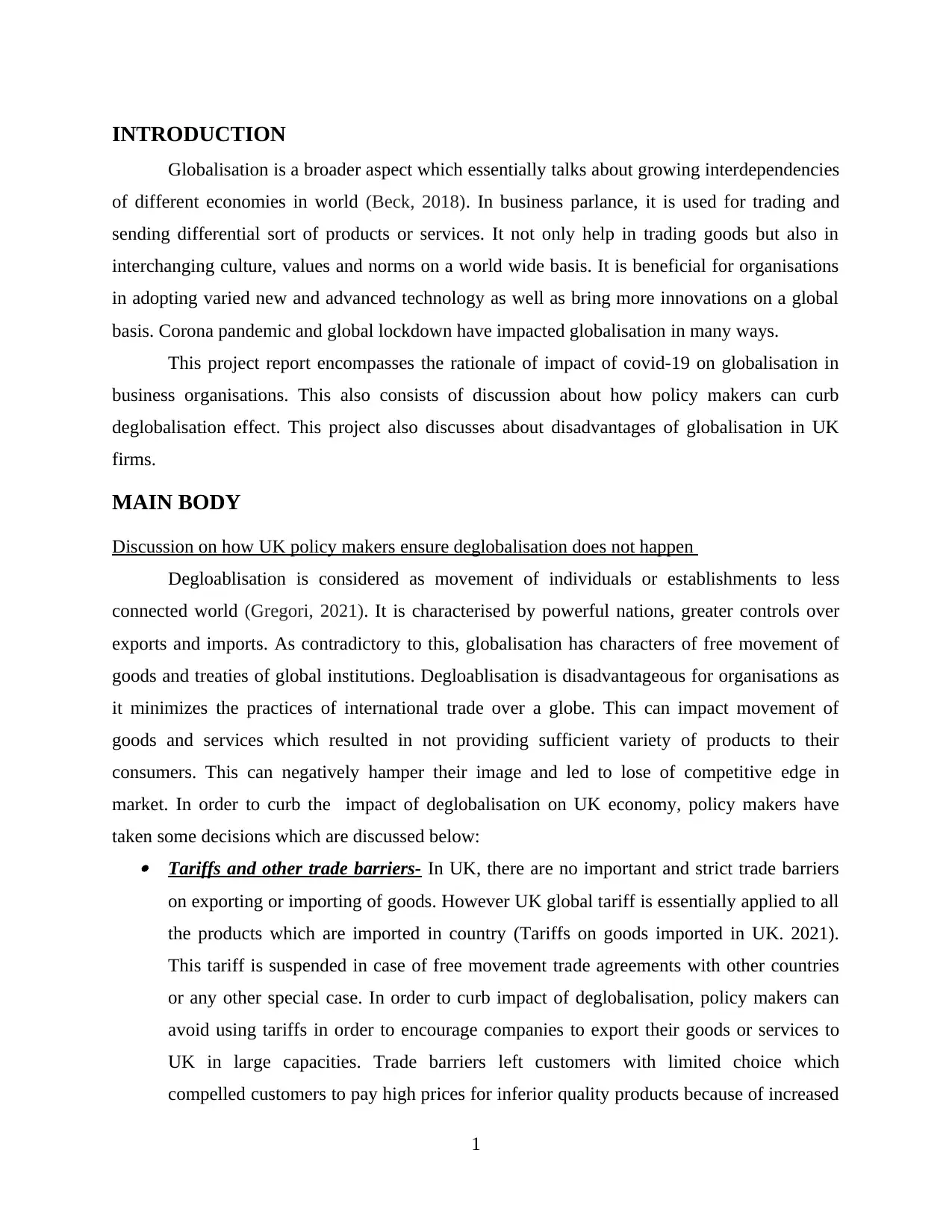
INTRODUCTION
Globalisation is a broader aspect which essentially talks about growing interdependencies
of different economies in world (Beck, 2018). In business parlance, it is used for trading and
sending differential sort of products or services. It not only help in trading goods but also in
interchanging culture, values and norms on a world wide basis. It is beneficial for organisations
in adopting varied new and advanced technology as well as bring more innovations on a global
basis. Corona pandemic and global lockdown have impacted globalisation in many ways.
This project report encompasses the rationale of impact of covid-19 on globalisation in
business organisations. This also consists of discussion about how policy makers can curb
deglobalisation effect. This project also discusses about disadvantages of globalisation in UK
firms.
MAIN BODY
Discussion on how UK policy makers ensure deglobalisation does not happen
Degloablisation is considered as movement of individuals or establishments to less
connected world (Gregori, 2021). It is characterised by powerful nations, greater controls over
exports and imports. As contradictory to this, globalisation has characters of free movement of
goods and treaties of global institutions. Degloablisation is disadvantageous for organisations as
it minimizes the practices of international trade over a globe. This can impact movement of
goods and services which resulted in not providing sufficient variety of products to their
consumers. This can negatively hamper their image and led to lose of competitive edge in
market. In order to curb the impact of deglobalisation on UK economy, policy makers have
taken some decisions which are discussed below: Tariffs and other trade barriers- In UK, there are no important and strict trade barriers
on exporting or importing of goods. However UK global tariff is essentially applied to all
the products which are imported in country (Tariffs on goods imported in UK. 2021).
This tariff is suspended in case of free movement trade agreements with other countries
or any other special case. In order to curb impact of deglobalisation, policy makers can
avoid using tariffs in order to encourage companies to export their goods or services to
UK in large capacities. Trade barriers left customers with limited choice which
compelled customers to pay high prices for inferior quality products because of increased
1
Globalisation is a broader aspect which essentially talks about growing interdependencies
of different economies in world (Beck, 2018). In business parlance, it is used for trading and
sending differential sort of products or services. It not only help in trading goods but also in
interchanging culture, values and norms on a world wide basis. It is beneficial for organisations
in adopting varied new and advanced technology as well as bring more innovations on a global
basis. Corona pandemic and global lockdown have impacted globalisation in many ways.
This project report encompasses the rationale of impact of covid-19 on globalisation in
business organisations. This also consists of discussion about how policy makers can curb
deglobalisation effect. This project also discusses about disadvantages of globalisation in UK
firms.
MAIN BODY
Discussion on how UK policy makers ensure deglobalisation does not happen
Degloablisation is considered as movement of individuals or establishments to less
connected world (Gregori, 2021). It is characterised by powerful nations, greater controls over
exports and imports. As contradictory to this, globalisation has characters of free movement of
goods and treaties of global institutions. Degloablisation is disadvantageous for organisations as
it minimizes the practices of international trade over a globe. This can impact movement of
goods and services which resulted in not providing sufficient variety of products to their
consumers. This can negatively hamper their image and led to lose of competitive edge in
market. In order to curb the impact of deglobalisation on UK economy, policy makers have
taken some decisions which are discussed below: Tariffs and other trade barriers- In UK, there are no important and strict trade barriers
on exporting or importing of goods. However UK global tariff is essentially applied to all
the products which are imported in country (Tariffs on goods imported in UK. 2021).
This tariff is suspended in case of free movement trade agreements with other countries
or any other special case. In order to curb impact of deglobalisation, policy makers can
avoid using tariffs in order to encourage companies to export their goods or services to
UK in large capacities. Trade barriers left customers with limited choice which
compelled customers to pay high prices for inferior quality products because of increased
1
⊘ This is a preview!⊘
Do you want full access?
Subscribe today to unlock all pages.

Trusted by 1+ million students worldwide
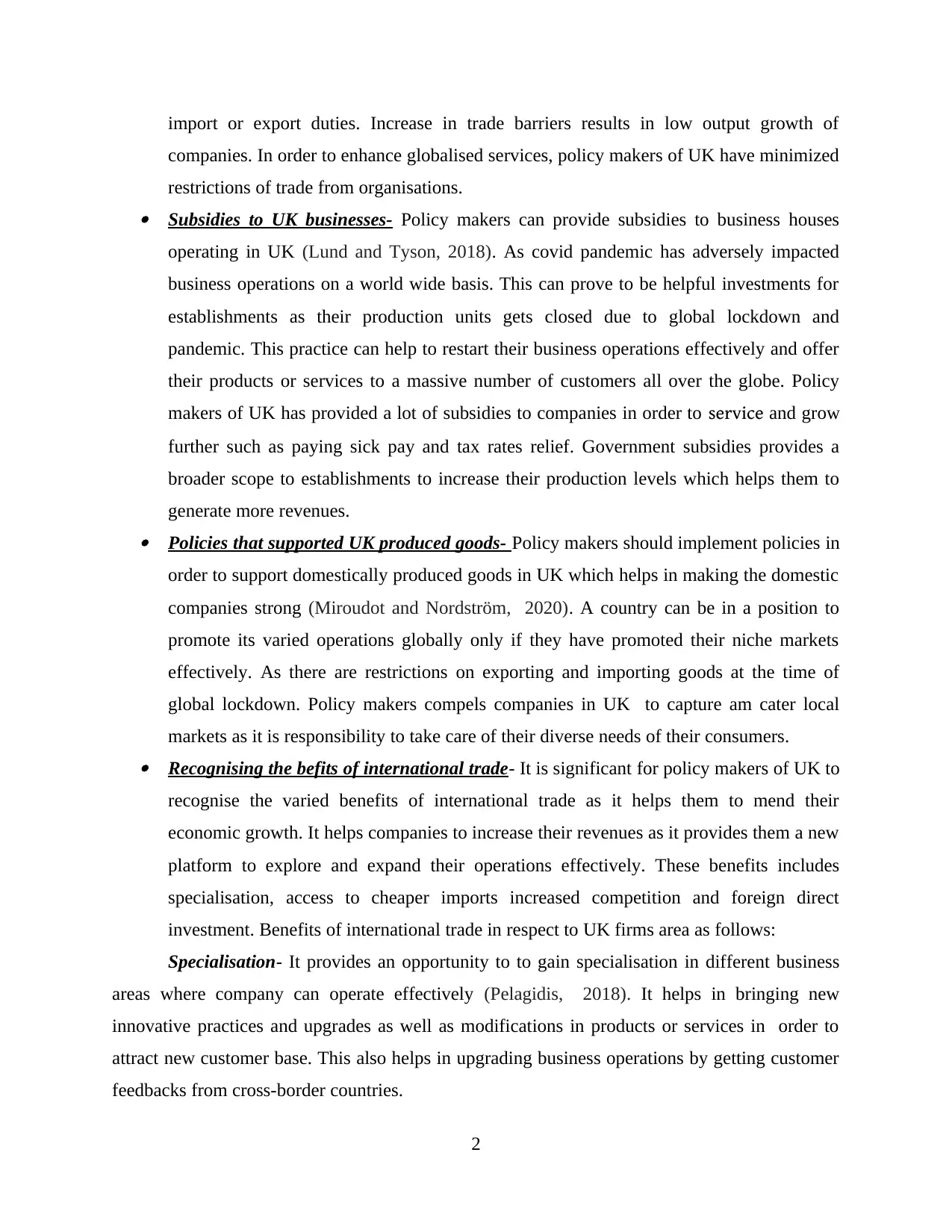
import or export duties. Increase in trade barriers results in low output growth of
companies. In order to enhance globalised services, policy makers of UK have minimized
restrictions of trade from organisations. Subsidies to UK businesses- Policy makers can provide subsidies to business houses
operating in UK (Lund and Tyson, 2018). As covid pandemic has adversely impacted
business operations on a world wide basis. This can prove to be helpful investments for
establishments as their production units gets closed due to global lockdown and
pandemic. This practice can help to restart their business operations effectively and offer
their products or services to a massive number of customers all over the globe. Policy
makers of UK has provided a lot of subsidies to companies in order to service and grow
further such as paying sick pay and tax rates relief. Government subsidies provides a
broader scope to establishments to increase their production levels which helps them to
generate more revenues. Policies that supported UK produced goods- Policy makers should implement policies in
order to support domestically produced goods in UK which helps in making the domestic
companies strong (Miroudot and Nordström, 2020). A country can be in a position to
promote its varied operations globally only if they have promoted their niche markets
effectively. As there are restrictions on exporting and importing goods at the time of
global lockdown. Policy makers compels companies in UK to capture am cater local
markets as it is responsibility to take care of their diverse needs of their consumers. Recognising the befits of international trade- It is significant for policy makers of UK to
recognise the varied benefits of international trade as it helps them to mend their
economic growth. It helps companies to increase their revenues as it provides them a new
platform to explore and expand their operations effectively. These benefits includes
specialisation, access to cheaper imports increased competition and foreign direct
investment. Benefits of international trade in respect to UK firms area as follows:
Specialisation- It provides an opportunity to to gain specialisation in different business
areas where company can operate effectively (Pelagidis, 2018). It helps in bringing new
innovative practices and upgrades as well as modifications in products or services in order to
attract new customer base. This also helps in upgrading business operations by getting customer
feedbacks from cross-border countries.
2
companies. In order to enhance globalised services, policy makers of UK have minimized
restrictions of trade from organisations. Subsidies to UK businesses- Policy makers can provide subsidies to business houses
operating in UK (Lund and Tyson, 2018). As covid pandemic has adversely impacted
business operations on a world wide basis. This can prove to be helpful investments for
establishments as their production units gets closed due to global lockdown and
pandemic. This practice can help to restart their business operations effectively and offer
their products or services to a massive number of customers all over the globe. Policy
makers of UK has provided a lot of subsidies to companies in order to service and grow
further such as paying sick pay and tax rates relief. Government subsidies provides a
broader scope to establishments to increase their production levels which helps them to
generate more revenues. Policies that supported UK produced goods- Policy makers should implement policies in
order to support domestically produced goods in UK which helps in making the domestic
companies strong (Miroudot and Nordström, 2020). A country can be in a position to
promote its varied operations globally only if they have promoted their niche markets
effectively. As there are restrictions on exporting and importing goods at the time of
global lockdown. Policy makers compels companies in UK to capture am cater local
markets as it is responsibility to take care of their diverse needs of their consumers. Recognising the befits of international trade- It is significant for policy makers of UK to
recognise the varied benefits of international trade as it helps them to mend their
economic growth. It helps companies to increase their revenues as it provides them a new
platform to explore and expand their operations effectively. These benefits includes
specialisation, access to cheaper imports increased competition and foreign direct
investment. Benefits of international trade in respect to UK firms area as follows:
Specialisation- It provides an opportunity to to gain specialisation in different business
areas where company can operate effectively (Pelagidis, 2018). It helps in bringing new
innovative practices and upgrades as well as modifications in products or services in order to
attract new customer base. This also helps in upgrading business operations by getting customer
feedbacks from cross-border countries.
2
Paraphrase This Document
Need a fresh take? Get an instant paraphrase of this document with our AI Paraphraser
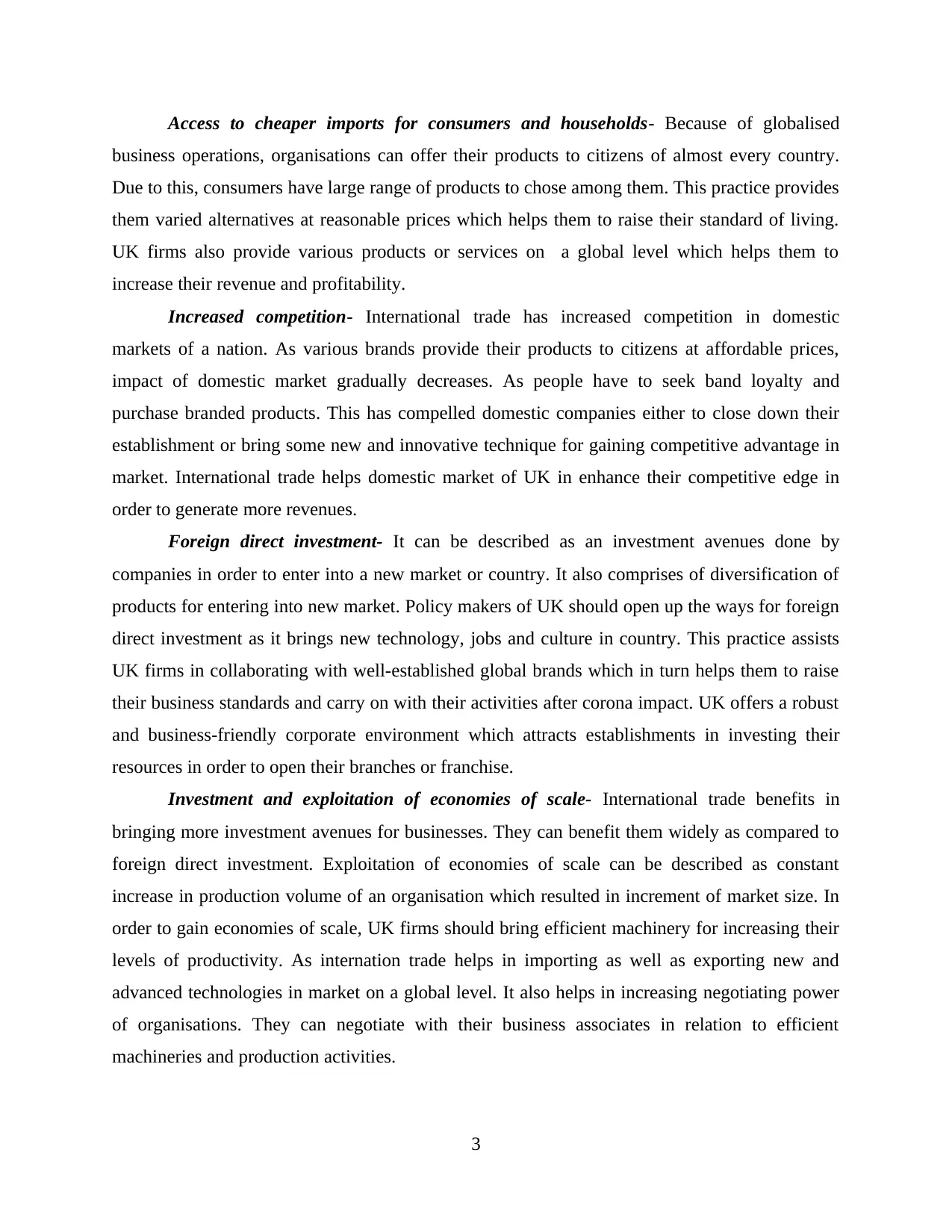
Access to cheaper imports for consumers and households- Because of globalised
business operations, organisations can offer their products to citizens of almost every country.
Due to this, consumers have large range of products to chose among them. This practice provides
them varied alternatives at reasonable prices which helps them to raise their standard of living.
UK firms also provide various products or services on a global level which helps them to
increase their revenue and profitability.
Increased competition- International trade has increased competition in domestic
markets of a nation. As various brands provide their products to citizens at affordable prices,
impact of domestic market gradually decreases. As people have to seek band loyalty and
purchase branded products. This has compelled domestic companies either to close down their
establishment or bring some new and innovative technique for gaining competitive advantage in
market. International trade helps domestic market of UK in enhance their competitive edge in
order to generate more revenues.
Foreign direct investment- It can be described as an investment avenues done by
companies in order to enter into a new market or country. It also comprises of diversification of
products for entering into new market. Policy makers of UK should open up the ways for foreign
direct investment as it brings new technology, jobs and culture in country. This practice assists
UK firms in collaborating with well-established global brands which in turn helps them to raise
their business standards and carry on with their activities after corona impact. UK offers a robust
and business-friendly corporate environment which attracts establishments in investing their
resources in order to open their branches or franchise.
Investment and exploitation of economies of scale- International trade benefits in
bringing more investment avenues for businesses. They can benefit them widely as compared to
foreign direct investment. Exploitation of economies of scale can be described as constant
increase in production volume of an organisation which resulted in increment of market size. In
order to gain economies of scale, UK firms should bring efficient machinery for increasing their
levels of productivity. As internation trade helps in importing as well as exporting new and
advanced technologies in market on a global level. It also helps in increasing negotiating power
of organisations. They can negotiate with their business associates in relation to efficient
machineries and production activities.
3
business operations, organisations can offer their products to citizens of almost every country.
Due to this, consumers have large range of products to chose among them. This practice provides
them varied alternatives at reasonable prices which helps them to raise their standard of living.
UK firms also provide various products or services on a global level which helps them to
increase their revenue and profitability.
Increased competition- International trade has increased competition in domestic
markets of a nation. As various brands provide their products to citizens at affordable prices,
impact of domestic market gradually decreases. As people have to seek band loyalty and
purchase branded products. This has compelled domestic companies either to close down their
establishment or bring some new and innovative technique for gaining competitive advantage in
market. International trade helps domestic market of UK in enhance their competitive edge in
order to generate more revenues.
Foreign direct investment- It can be described as an investment avenues done by
companies in order to enter into a new market or country. It also comprises of diversification of
products for entering into new market. Policy makers of UK should open up the ways for foreign
direct investment as it brings new technology, jobs and culture in country. This practice assists
UK firms in collaborating with well-established global brands which in turn helps them to raise
their business standards and carry on with their activities after corona impact. UK offers a robust
and business-friendly corporate environment which attracts establishments in investing their
resources in order to open their branches or franchise.
Investment and exploitation of economies of scale- International trade benefits in
bringing more investment avenues for businesses. They can benefit them widely as compared to
foreign direct investment. Exploitation of economies of scale can be described as constant
increase in production volume of an organisation which resulted in increment of market size. In
order to gain economies of scale, UK firms should bring efficient machinery for increasing their
levels of productivity. As internation trade helps in importing as well as exporting new and
advanced technologies in market on a global level. It also helps in increasing negotiating power
of organisations. They can negotiate with their business associates in relation to efficient
machineries and production activities.
3
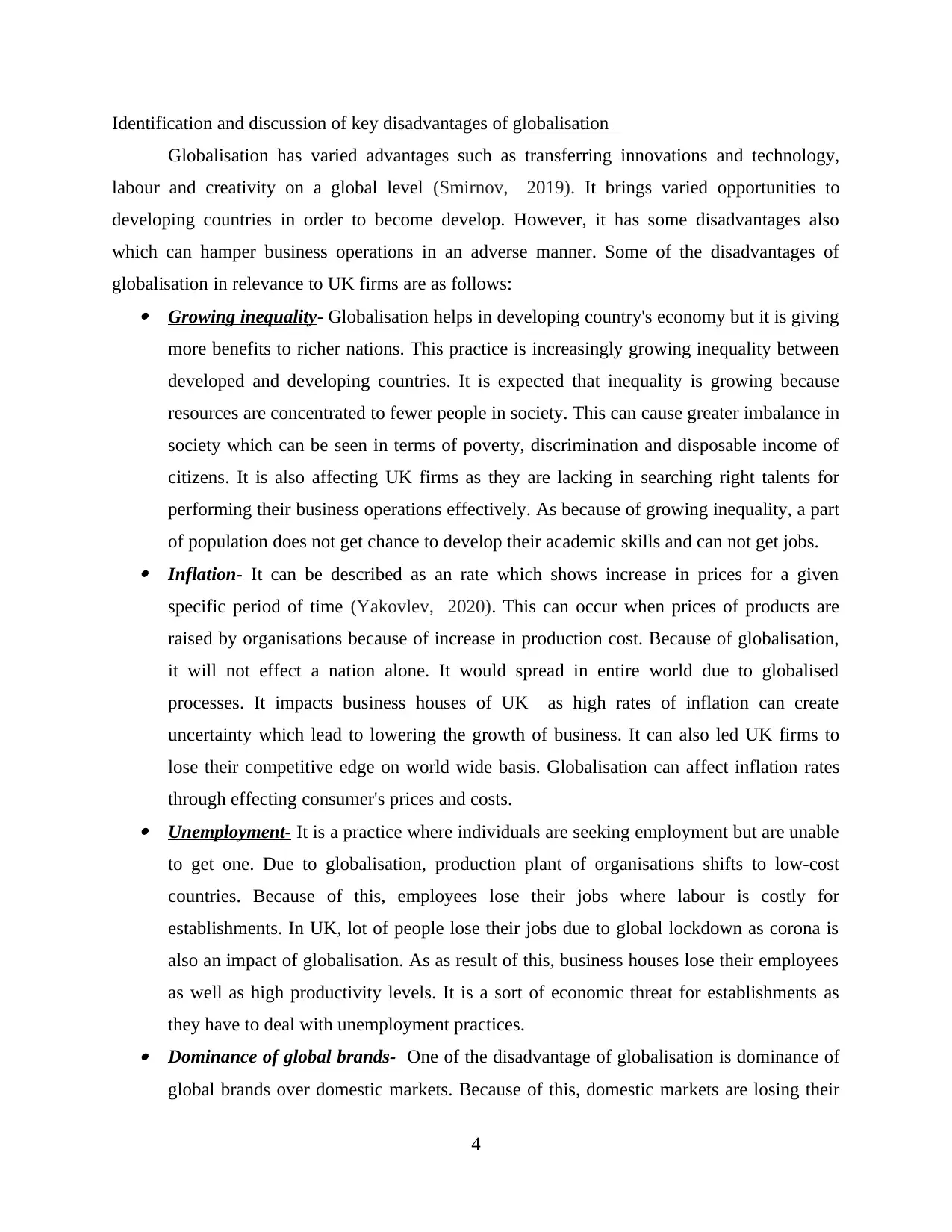
Identification and discussion of key disadvantages of globalisation
Globalisation has varied advantages such as transferring innovations and technology,
labour and creativity on a global level (Smirnov, 2019). It brings varied opportunities to
developing countries in order to become develop. However, it has some disadvantages also
which can hamper business operations in an adverse manner. Some of the disadvantages of
globalisation in relevance to UK firms are as follows: Growing inequality- Globalisation helps in developing country's economy but it is giving
more benefits to richer nations. This practice is increasingly growing inequality between
developed and developing countries. It is expected that inequality is growing because
resources are concentrated to fewer people in society. This can cause greater imbalance in
society which can be seen in terms of poverty, discrimination and disposable income of
citizens. It is also affecting UK firms as they are lacking in searching right talents for
performing their business operations effectively. As because of growing inequality, a part
of population does not get chance to develop their academic skills and can not get jobs. Inflation- It can be described as an rate which shows increase in prices for a given
specific period of time (Yakovlev, 2020). This can occur when prices of products are
raised by organisations because of increase in production cost. Because of globalisation,
it will not effect a nation alone. It would spread in entire world due to globalised
processes. It impacts business houses of UK as high rates of inflation can create
uncertainty which lead to lowering the growth of business. It can also led UK firms to
lose their competitive edge on world wide basis. Globalisation can affect inflation rates
through effecting consumer's prices and costs. Unemployment- It is a practice where individuals are seeking employment but are unable
to get one. Due to globalisation, production plant of organisations shifts to low-cost
countries. Because of this, employees lose their jobs where labour is costly for
establishments. In UK, lot of people lose their jobs due to global lockdown as corona is
also an impact of globalisation. As as result of this, business houses lose their employees
as well as high productivity levels. It is a sort of economic threat for establishments as
they have to deal with unemployment practices. Dominance of global brands- One of the disadvantage of globalisation is dominance of
global brands over domestic markets. Because of this, domestic markets are losing their
4
Globalisation has varied advantages such as transferring innovations and technology,
labour and creativity on a global level (Smirnov, 2019). It brings varied opportunities to
developing countries in order to become develop. However, it has some disadvantages also
which can hamper business operations in an adverse manner. Some of the disadvantages of
globalisation in relevance to UK firms are as follows: Growing inequality- Globalisation helps in developing country's economy but it is giving
more benefits to richer nations. This practice is increasingly growing inequality between
developed and developing countries. It is expected that inequality is growing because
resources are concentrated to fewer people in society. This can cause greater imbalance in
society which can be seen in terms of poverty, discrimination and disposable income of
citizens. It is also affecting UK firms as they are lacking in searching right talents for
performing their business operations effectively. As because of growing inequality, a part
of population does not get chance to develop their academic skills and can not get jobs. Inflation- It can be described as an rate which shows increase in prices for a given
specific period of time (Yakovlev, 2020). This can occur when prices of products are
raised by organisations because of increase in production cost. Because of globalisation,
it will not effect a nation alone. It would spread in entire world due to globalised
processes. It impacts business houses of UK as high rates of inflation can create
uncertainty which lead to lowering the growth of business. It can also led UK firms to
lose their competitive edge on world wide basis. Globalisation can affect inflation rates
through effecting consumer's prices and costs. Unemployment- It is a practice where individuals are seeking employment but are unable
to get one. Due to globalisation, production plant of organisations shifts to low-cost
countries. Because of this, employees lose their jobs where labour is costly for
establishments. In UK, lot of people lose their jobs due to global lockdown as corona is
also an impact of globalisation. As as result of this, business houses lose their employees
as well as high productivity levels. It is a sort of economic threat for establishments as
they have to deal with unemployment practices. Dominance of global brands- One of the disadvantage of globalisation is dominance of
global brands over domestic markets. Because of this, domestic markets are losing their
4
⊘ This is a preview!⊘
Do you want full access?
Subscribe today to unlock all pages.

Trusted by 1+ million students worldwide
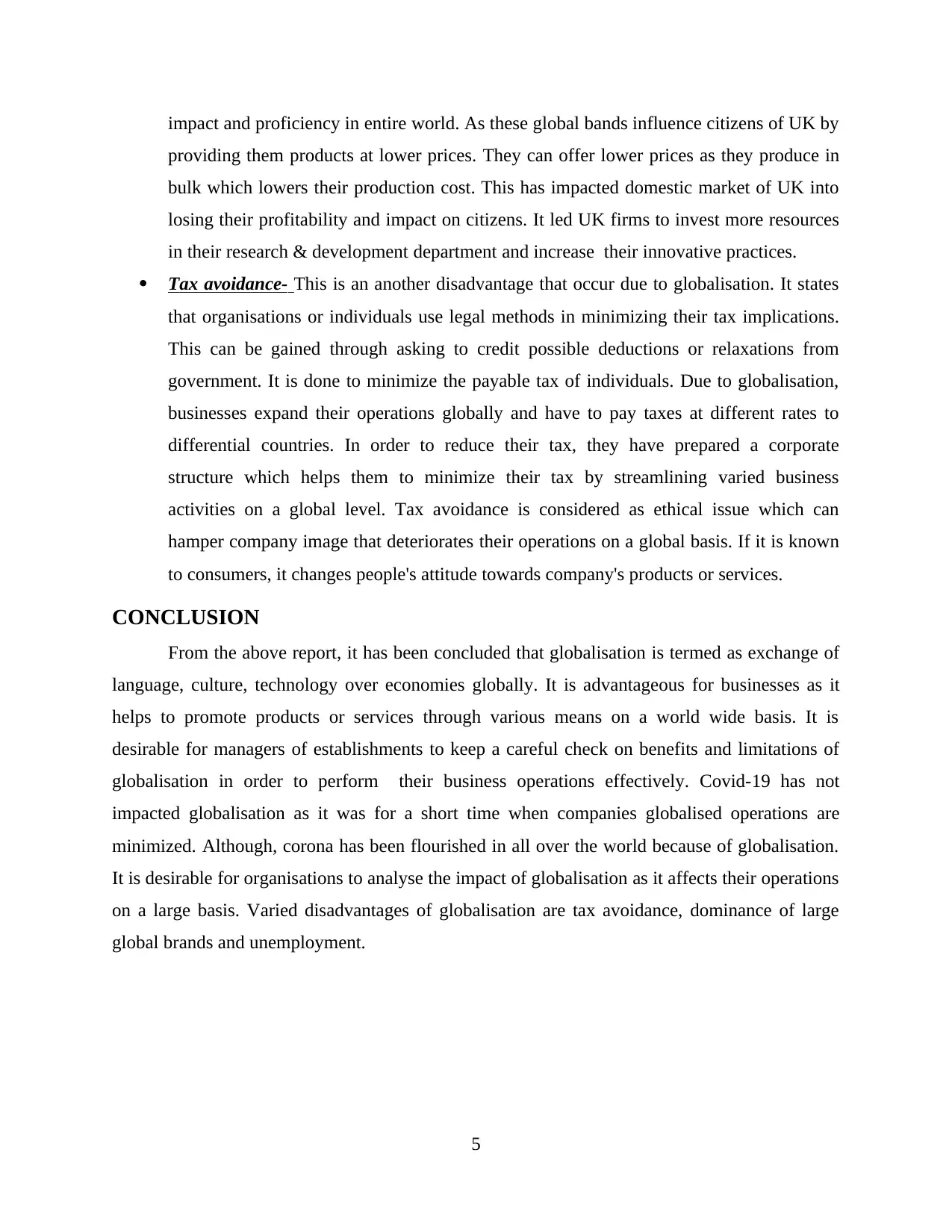
impact and proficiency in entire world. As these global bands influence citizens of UK by
providing them products at lower prices. They can offer lower prices as they produce in
bulk which lowers their production cost. This has impacted domestic market of UK into
losing their profitability and impact on citizens. It led UK firms to invest more resources
in their research & development department and increase their innovative practices.
Tax avoidance- This is an another disadvantage that occur due to globalisation. It states
that organisations or individuals use legal methods in minimizing their tax implications.
This can be gained through asking to credit possible deductions or relaxations from
government. It is done to minimize the payable tax of individuals. Due to globalisation,
businesses expand their operations globally and have to pay taxes at different rates to
differential countries. In order to reduce their tax, they have prepared a corporate
structure which helps them to minimize their tax by streamlining varied business
activities on a global level. Tax avoidance is considered as ethical issue which can
hamper company image that deteriorates their operations on a global basis. If it is known
to consumers, it changes people's attitude towards company's products or services.
CONCLUSION
From the above report, it has been concluded that globalisation is termed as exchange of
language, culture, technology over economies globally. It is advantageous for businesses as it
helps to promote products or services through various means on a world wide basis. It is
desirable for managers of establishments to keep a careful check on benefits and limitations of
globalisation in order to perform their business operations effectively. Covid-19 has not
impacted globalisation as it was for a short time when companies globalised operations are
minimized. Although, corona has been flourished in all over the world because of globalisation.
It is desirable for organisations to analyse the impact of globalisation as it affects their operations
on a large basis. Varied disadvantages of globalisation are tax avoidance, dominance of large
global brands and unemployment.
5
providing them products at lower prices. They can offer lower prices as they produce in
bulk which lowers their production cost. This has impacted domestic market of UK into
losing their profitability and impact on citizens. It led UK firms to invest more resources
in their research & development department and increase their innovative practices.
Tax avoidance- This is an another disadvantage that occur due to globalisation. It states
that organisations or individuals use legal methods in minimizing their tax implications.
This can be gained through asking to credit possible deductions or relaxations from
government. It is done to minimize the payable tax of individuals. Due to globalisation,
businesses expand their operations globally and have to pay taxes at different rates to
differential countries. In order to reduce their tax, they have prepared a corporate
structure which helps them to minimize their tax by streamlining varied business
activities on a global level. Tax avoidance is considered as ethical issue which can
hamper company image that deteriorates their operations on a global basis. If it is known
to consumers, it changes people's attitude towards company's products or services.
CONCLUSION
From the above report, it has been concluded that globalisation is termed as exchange of
language, culture, technology over economies globally. It is advantageous for businesses as it
helps to promote products or services through various means on a world wide basis. It is
desirable for managers of establishments to keep a careful check on benefits and limitations of
globalisation in order to perform their business operations effectively. Covid-19 has not
impacted globalisation as it was for a short time when companies globalised operations are
minimized. Although, corona has been flourished in all over the world because of globalisation.
It is desirable for organisations to analyse the impact of globalisation as it affects their operations
on a large basis. Varied disadvantages of globalisation are tax avoidance, dominance of large
global brands and unemployment.
5
Paraphrase This Document
Need a fresh take? Get an instant paraphrase of this document with our AI Paraphraser
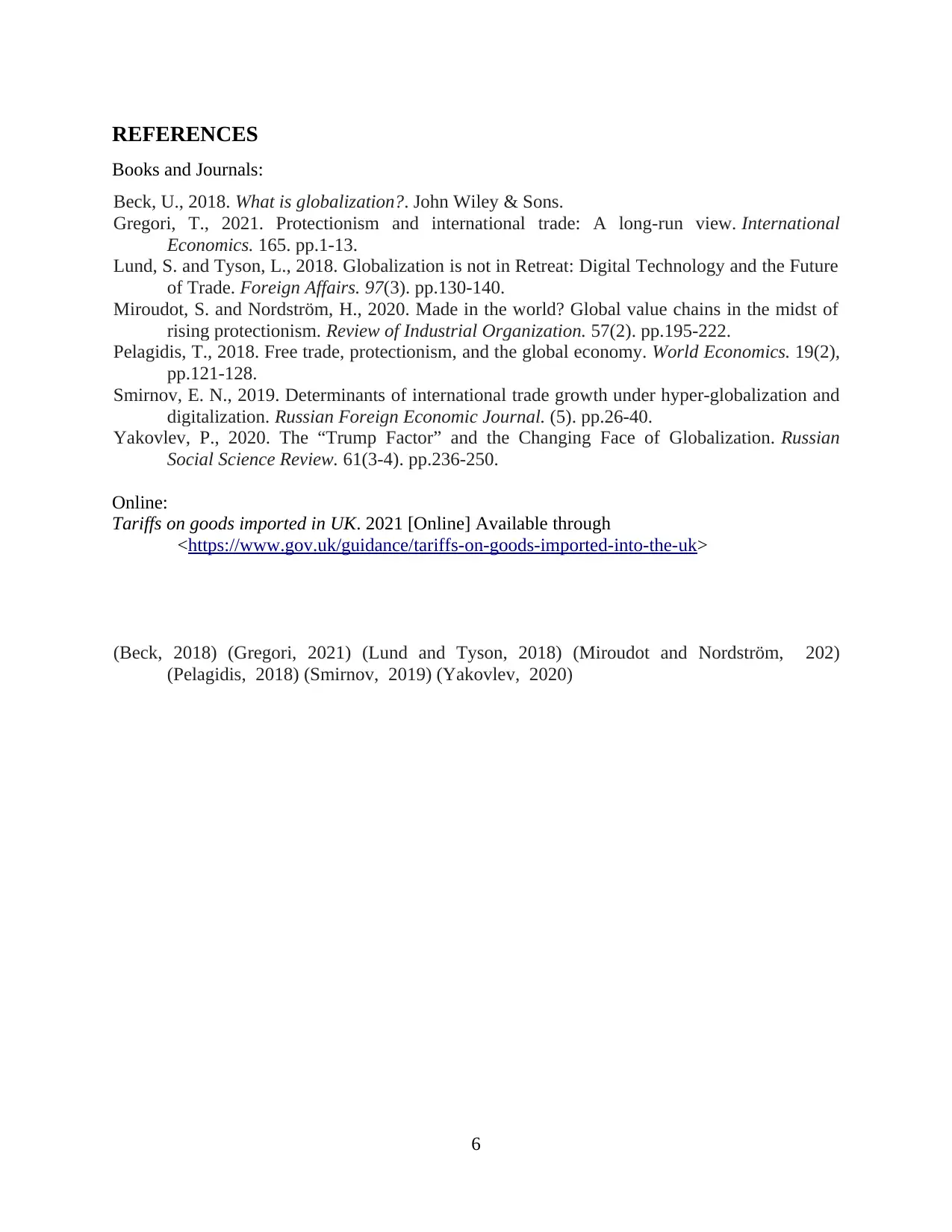
REFERENCES
Books and Journals:
Beck, U., 2018. What is globalization?. John Wiley & Sons.
Gregori, T., 2021. Protectionism and international trade: A long-run view. International
Economics. 165. pp.1-13.
Lund, S. and Tyson, L., 2018. Globalization is not in Retreat: Digital Technology and the Future
of Trade. Foreign Affairs. 97(3). pp.130-140.
Miroudot, S. and Nordström, H., 2020. Made in the world? Global value chains in the midst of
rising protectionism. Review of Industrial Organization. 57(2). pp.195-222.
Pelagidis, T., 2018. Free trade, protectionism, and the global economy. World Economics. 19(2),
pp.121-128.
Smirnov, E. N., 2019. Determinants of international trade growth under hyper-globalization and
digitalization. Russian Foreign Economic Journal. (5). pp.26-40.
Yakovlev, P., 2020. The “Trump Factor” and the Changing Face of Globalization. Russian
Social Science Review. 61(3-4). pp.236-250.
Online:
Tariffs on goods imported in UK. 2021 [Online] Available through
<https://www.gov.uk/guidance/tariffs-on-goods-imported-into-the-uk>
(Beck, 2018) (Gregori, 2021) (Lund and Tyson, 2018) (Miroudot and Nordström, 202)
(Pelagidis, 2018) (Smirnov, 2019) (Yakovlev, 2020)
6
Books and Journals:
Beck, U., 2018. What is globalization?. John Wiley & Sons.
Gregori, T., 2021. Protectionism and international trade: A long-run view. International
Economics. 165. pp.1-13.
Lund, S. and Tyson, L., 2018. Globalization is not in Retreat: Digital Technology and the Future
of Trade. Foreign Affairs. 97(3). pp.130-140.
Miroudot, S. and Nordström, H., 2020. Made in the world? Global value chains in the midst of
rising protectionism. Review of Industrial Organization. 57(2). pp.195-222.
Pelagidis, T., 2018. Free trade, protectionism, and the global economy. World Economics. 19(2),
pp.121-128.
Smirnov, E. N., 2019. Determinants of international trade growth under hyper-globalization and
digitalization. Russian Foreign Economic Journal. (5). pp.26-40.
Yakovlev, P., 2020. The “Trump Factor” and the Changing Face of Globalization. Russian
Social Science Review. 61(3-4). pp.236-250.
Online:
Tariffs on goods imported in UK. 2021 [Online] Available through
<https://www.gov.uk/guidance/tariffs-on-goods-imported-into-the-uk>
(Beck, 2018) (Gregori, 2021) (Lund and Tyson, 2018) (Miroudot and Nordström, 202)
(Pelagidis, 2018) (Smirnov, 2019) (Yakovlev, 2020)
6
1 out of 8
Related Documents
Your All-in-One AI-Powered Toolkit for Academic Success.
+13062052269
info@desklib.com
Available 24*7 on WhatsApp / Email
![[object Object]](/_next/static/media/star-bottom.7253800d.svg)
Unlock your academic potential
Copyright © 2020–2026 A2Z Services. All Rights Reserved. Developed and managed by ZUCOL.





